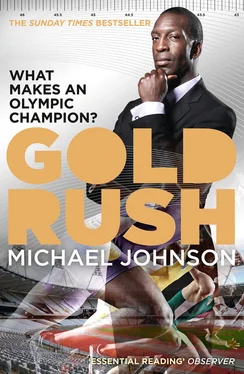Finally the official notified us that we had five minutes before going out. It was night-time and the temperature was perfect. I put on my spikes and waited. At this point I would always take the opportunity to look at my competition to see if I could gauge their feelings at this moment. Are they feeling confident, afraid or absolutely scared to death? Frankie’s demeanour was always mellow, which you might take for scared but that would be a mistake. I knew Frankie well and I knew that the fact that he didn’t have an aggressive personality did not mean that he wouldn’t run a fast race. Ato Boldon was the opposite. He always purposely carried himself with confidence. But he had never beaten me and I saw nothing in him that made me think today would be any different.
They lined us up according to lane and we walked out into the stadium. I didn’t look into the stands despite the flashes going off, but I couldn’t help noticing the screams and yells, all of which seemed to be directing me to win this race. ‘Go Michael!’ ‘You’re the best, Michael.’ ‘Give me your shoes!’ ‘I love you!’ Talk about pressure! But I liked being the favourite.
I walked on to the track, sat my bag down and positioned my blocks. ‘If I don’t run as fast as I know I can, it will be because of my start,’ I thought. So I took a practice start, going out about 200 metres. It was a good one. My starts were kind of a mixed bag. Sometimes I would get a good one and sometimes I would get an okay one. Rarely would I get a great one and never would I get a terrible one. I was happy with this one.
I got back to my blocks and settled in for another practice start. I got into the set position and imagined the bang of the gun and took off. I didn’t like my second start at all, but I kept running and focused on the drive phase of the race. If a start didn’t go well there was nothing I could do about it. I had to move on.
The drive phase went well, but it always did. I never had a problem with that part of the race. I walked back to my blocks, sat down and waited for the command to take our warm-up clothes off. I wouldn’t risk another start no matter how dissatisfied I had been with the last one, because that was not part of my routine.
As I sat there I thought about the Olympic 200 metres final I was about to run. Suddenly what had happened during the previous 1992 Olympics in Barcelona flashed in my head. As I normally did whenever I recognised that I had lost focus, I started my automatic default mechanism of visualising myself running the race. But part of my mind continued to dwell on the disappointment I’d suffered in Barcelona. I tried to control my thoughts. ‘Your competitors don’t care about your disappointment four years earlier,’ I told myself. ‘They just want to beat you today.’
Finally, I decided to allow myself to think about 1992. ‘I have run this race over and over again in my mind a million times and I’m ready,’ I told myself. ‘I wanted that gold medal in Barcelona so badly. This is another chance to get it. And I’m not going to let anything stand in my way. I’m healthy and ready to go.’
‘Warm-ups off,’ announced the official. I stopped thinking about 1992 and stripped down to my shorts and tank top. I was happy that I had allowed myself to think about Barcelona. That would be even more motivation for me.
Just moments before the start of the Olympic 200 metres final, I couldn’t help but remind myself, ‘This is not just any other race. This is a once-in-a-lifetime opportunity. I can win it and I can make history, but to do that I must run a mistake-free race.’ Deep into my focus, I thought about the things that I needed to do in the race along with those areas where I was most prone to making a mistake. I knew that Frankie and Ato, both being 100 metres specialists, were better starters than me. I also knew that a poor start induced by my thinking ahead to the 100-metre mark had caused me to lose to Frankie a couple of weeks earlier. Frankie had improved so much lately that I knew I would have to have a greater advantage over him at the halfway point of the race than I had in previous victories if I was going to beat him again.
While that was good knowledge to have before the race, I knew it was a mistake to be thinking ahead. You must take one stage of the race at a time and you must be focused only on the present stage of the race as opposed to two stages or even one stage ahead. Thinking about what I needed to be doing at the halfway mark meant that I wasn’t fully focused on the start and reacting to the gun. I vowed I would not repeat the mistake that had cost me a win just 14 days before.
After the introductions, which seemed to take forever, the starter finally called us to the starting blocks. At his cry of ‘On your marks’ I wanted to get into my blocks right away because I was ready to go. But that wasn’t my routine. I hated to be in position and have to wait for someone to finally start getting into theirs, so I always delayed a few seconds.
When I saw that everyone was getting into their blocks, I got into mine and waited. The starter announced, ‘Set!’ I rose to the set position and focused on the impending sound of the gun. Bang! I exploded out of the blocks.
My reaction time, 0.161 seconds, my best ever, was so good, I wasn’t ready for it. I drove my left foot off the rear block, pushed with my right foot on the front block and, with all of the force that I had, thrust my right arm forward and swung my left arm back, keeping my head down all through the first driving step out of the blocks. It went perfectly. Then everything switched and now I was pulling my right foot forward and pushing on the ground with my left foot and driving my left arm forward and swinging my right arm back with equal force as in the first stride. That all went perfectly as well.
Normally this process of driving out of the blocks with these steps goes on for at least ten steps. Ideally, the way the blocks are set up, during these ten steps your body is at a maximum 45-degree angle in relation to the track, which allows each step not to push down on the track but to push against the track, propelling your body forward with each push. In order to overcome gravity, a sprinter must utilise upper body strength and power and exaggerate the swing of the arms to prevent tripping and falling over.
I had shot out of the blocks so rapidly – probably due to a surge of adrenaline along with my intensified focus on the start – that my body bent at an angle deeper than the ideal 45 degrees. And my arm swing was not sufficient to keep up with the angle that I had achieved. That caught up with me on the third step. I was going back to my right foot driving forward, and my left foot had already made contact with the ground and I was starting to push with it. Just as I was switching over I felt my upper body start to fall over. To catch myself and stay upright, I had to shorten my right foot stride to hit the ground quicker than it should have.
I had allowed the moment and what I was about to do to take me out of my normal start which, while maybe not as great as some of the other sprinters, was good for me. I had just gotten the best start of my life, but I couldn’t handle a start that good. Focusing on the magnitude of the event and what was at stake, instead of executing the best I knew how, almost cost me Olympic gold and history. Fortunately one of the things that I was always good at and always prepared for is holding composure and getting over mistakes and moving on.
Mistakes are part of competing. You know that they will occur and you always try to minimise them, but when one happens during the race you must move on and determine quickly whether there is an adjustment to be made as a result of that mistake or if you continue with the same plan. I knew that having made a mistake you could not dwell on it or allow it to impact negatively on the rest of your race.
Читать дальше












